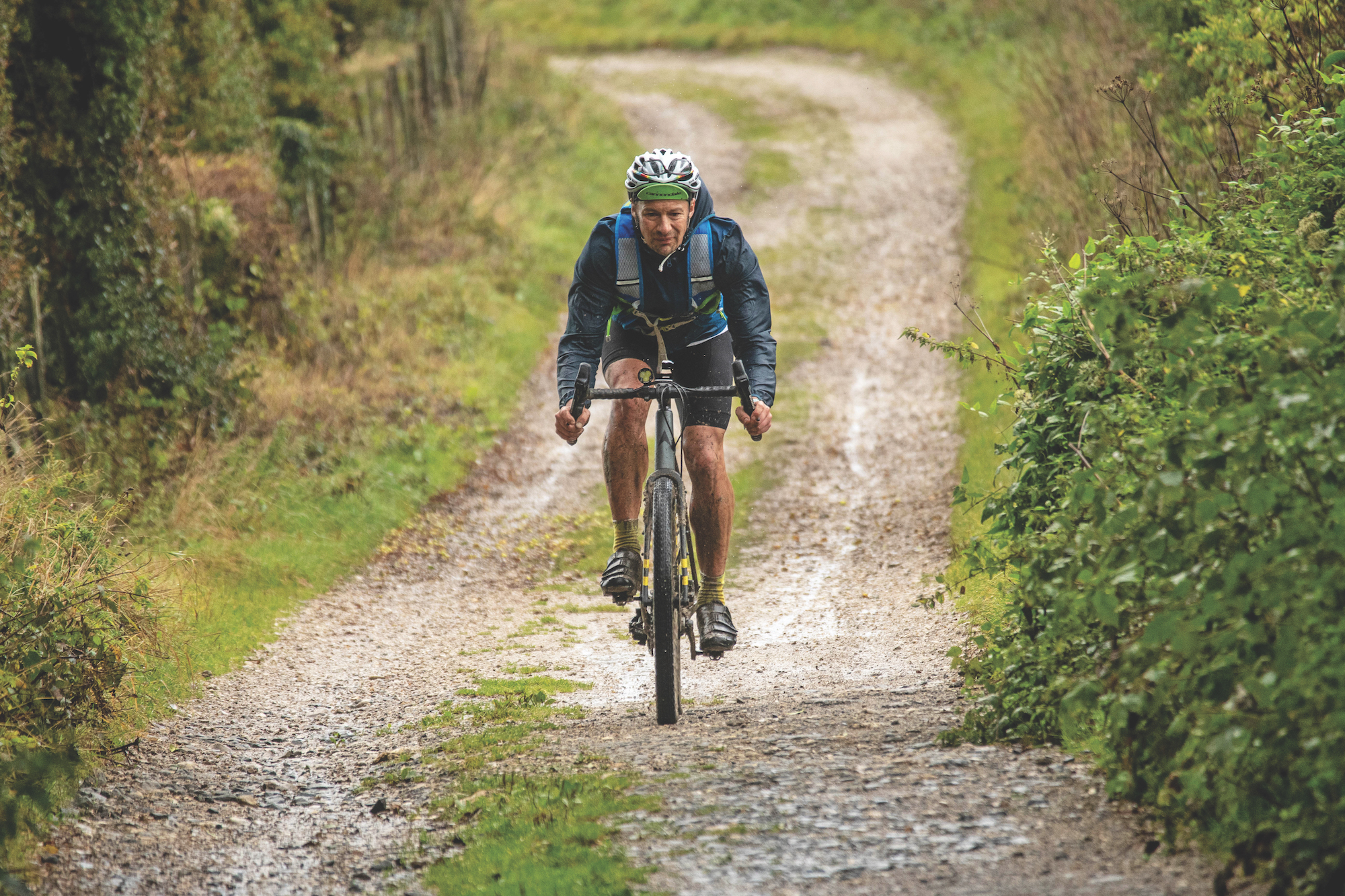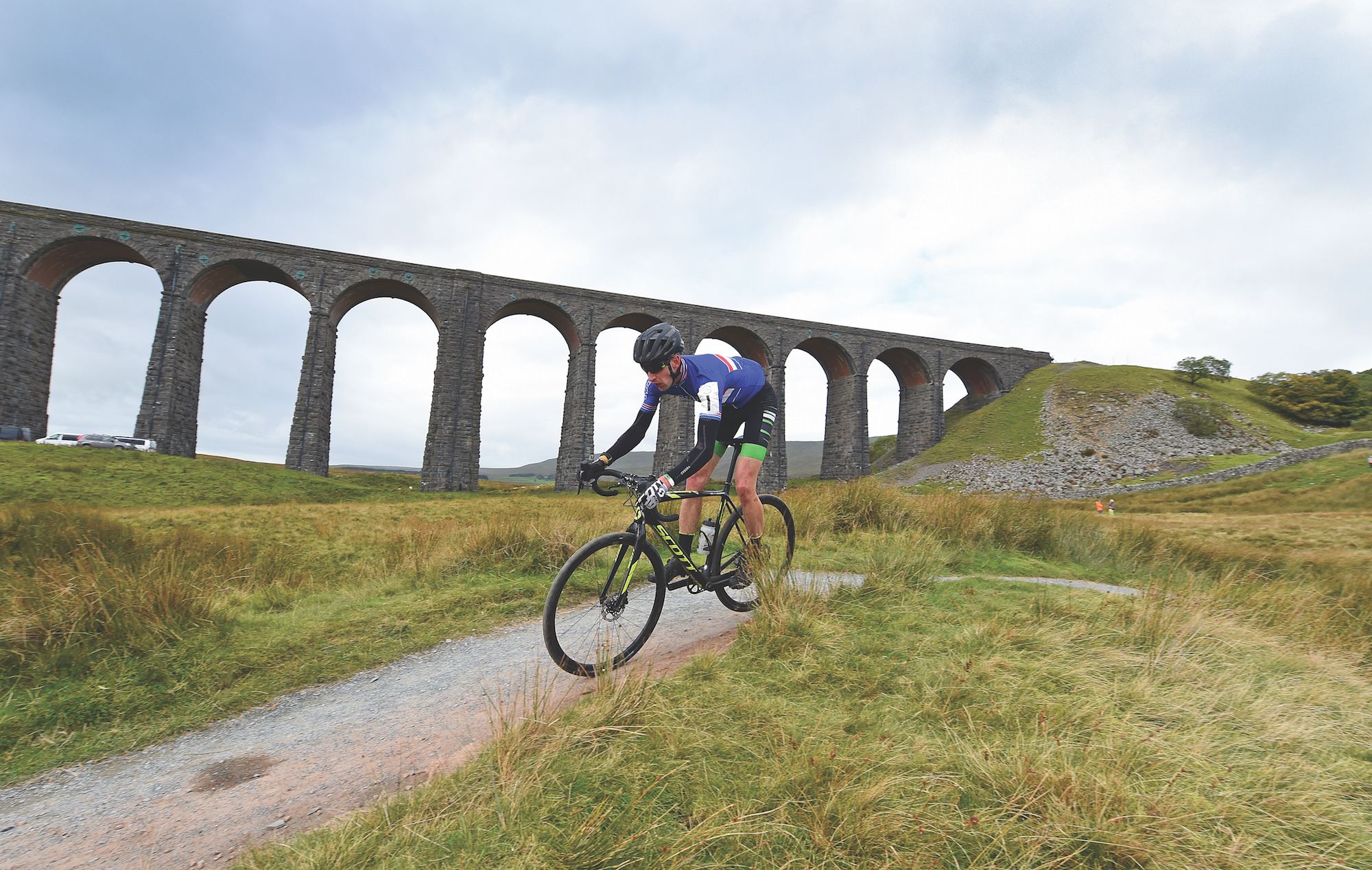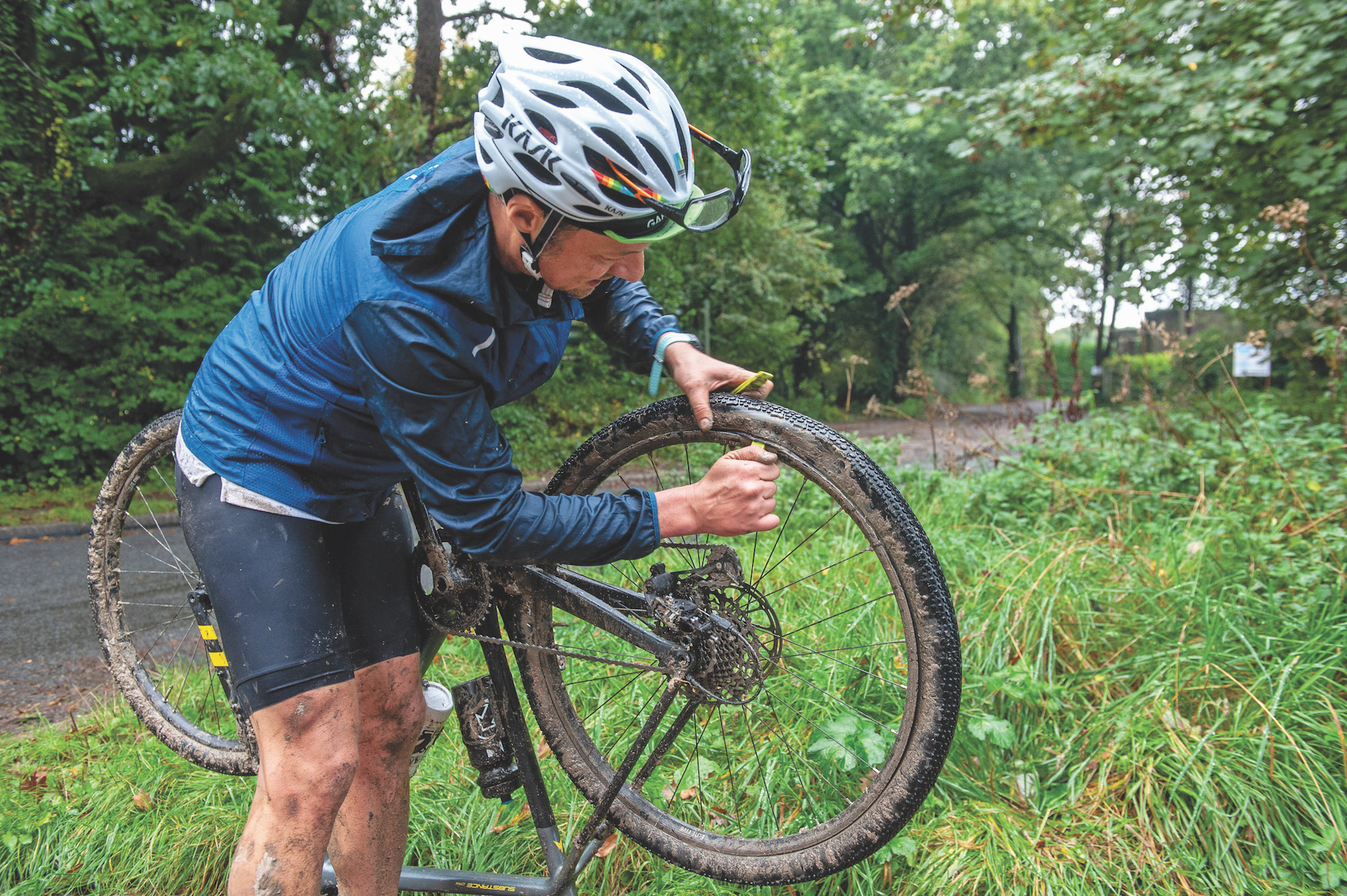Need a new challenge? Here's how I jumped into the world of cyclocross
After too long tirelessly toiling in the confines of his backyard shed, Steve Shrubshall looks to pastures new for a challenge with a fresh set of riding and fitness demands

Stephen Shrubshall trying out cyclocross
The latest race content, interviews, features, reviews and expert buying guides, direct to your inbox!
You are now subscribed
Your newsletter sign-up was successful
There’s a lot to be said for indoor training sessions. They tend to make you very fit. Each workout is precisely engineered and tailored to your specific demands. Whether you want to increase neuromuscular power, raise your anaerobic threshold, or simply become more efficient over longer distances, the turbo-trainer has got you covered.
However, after a winter, spring and the best part of summer grafting in the pain cave (AKA my garden shed), I was beginning to become a little bored with the view.
>>> Subscriptions deals for Cycling Weekly magazine
Indeed, having added 50 watts to my FTP as a result of a rigorous indoor training plan - a project I wrote about in Cycling Weekly earlier this year - it was time to venture beyond the realms of my back garden and pedal in pastures new. The call of the great outdoors was becoming ever more resonant. I needed a new challenge, to physically exert myself in fresh air and acquire new strength and fitness while I trained for my chosen event. And I had to set my sights on something…
Time trialling was a known entity, with my last outing against the clock concluding prematurely - splayed out, bloodied and battered in the middle of a country lane in Surrey. As much as I like country lanes in Surrey, I had no desire to exchange bodily fluids with them again, and with autumn fast approaching, maybe it was time to steer off the tarmac track and into the wooded unknown.
Cyclocross and off-road endurance disciplines, however, demand the employment of a different set of biomechanics. The transition from shed-based threshold sessions to the explosive energy and strength required to compete in these events would be far from seamless. I spoke with three experts to find out the type of training I’d need to do to make me more of a complete cyclist.
The way of the cross
The latest race content, interviews, features, reviews and expert buying guides, direct to your inbox!
Perhaps the doyen of all cyclocross challenges, the Three Peaks in Yorkshire takes on the Dales’s three highest peaks: Ingleborough, Whernside and Pen-y-ghent. With no tyre width over 35mm allowed on the course, the Three Peaks is both extremely technical and physically demanding.
My first step was calling three-time winner Paul Oldham. "A big part of the race is getting a bike round in one piece, so practising being smooth and ‘light’ on the bike is probably more important than going fast," he told me.
>>> Cycling Weekly is available on your Smart phone, tablet and desktop
Owing to the precipitous nature of the climbs, the Peaks is infamous for the amount of time spent off the bike; a motor-assisted mountain bike may have the power and compliance to reach the top, but on a rigid CX rig with no suspension and limited gear ratios, a certain amount of shouldering is inevitable, and an absolutely integral part of any training plan for this event.
"The main training, though, is with, not on, your bike," continued Oldham. "Get used to it on your shoulder, this is important due to the amount of time in the race that you will have to carry it. This is also to get you used to the different style of walking/running with a bike - you only have one arm free, so it is totally different - and also to get used to the extra weight on your legs."
Strength and conditioning is also vital, and while you may want to carry out these exercises in a gym, it’s just as easy to gain the required leg power in the comfort of your own living room. "Squats, lunges, step-ups and calf raises are easy to fit it into a day," says Oldham. "You can smash a fair few of these out in 15 to 20 minutes and they can be done anywhere."
Training for the Three Peaks, then, is a sure-fire way of taking your fitness to a new level, but it may not float the boat of those who are looking for a monthly or weekly challenge. Cyclocross leagues run for most of the year, with the autumn and winter being the most popular time to saddle up your CX steed. Courses can be found up and down the country, each offering varying degrees of difficulty.
To run or to ride?

Advice for this discipline was sought closer to home, from CX stalwart and CW picture editor Simon Scarsbrook.
"Early season or summer cyclocross, where the weather is less of an issue, would be a good course for a beginner," he advised. "Summer cyclocross is usually more relaxed and the early-season event weather is usually favourable — there’s less to consider in terms of tyre pressures and you can concentrate on full-on riding."
By their nature, cyclocross courses are invariably littered with obstacles and features that require riders to employ a broad range of skills. Unlike road riding where drafting, aerodynamics and reacting to surges cover the important bases, CX riding is moment-to-moment reactive, and adjustments to bike and body are almost constant.
"On advanced courses, one of the skills is knowing when to back off," said Simon. "Running may be quicker than trying to ride the elements that are out of your skill range, but if riding is quicker, those skills need to be adapted. One of the trickier aspects is riding off-camber, especially in the wet, and time can be lost not having the skill of dismounting and remounting, as you’ll lose momentum."
Epic solo challenges
Organised races and events are one thing, but what about getting back to basics with a good old endurance schlep — saddling up the steed and spending an entire day, or longer, awheel? In the UK, there are myriad paths, byways and bridleways suitable for this kind of adventure. You’ll be free from traffic — and, if you’re lucky, any sign of human existence, save for the occasional trickle of chimney smoke on the distant horizon.
One such path, custom-designed for adventure cyclists not averse to regular intervals of pain, is the South Downs Way. Running 100 miles between Winchester in Hampshire, at its westernmost end, to Eastbourne in East Sussex, the trail features huge whale-backed grassy humps and is on many a cyclist’s bucket list. However, a high percentage of those attempting to dispatch the trail in a single sitting fall foul of either the weather, the technical terrain, or just a lack of fitness.
Making mere mortals of most of us, 15-year-old Bill Balding has not only completed the SDW, but got to the end, turned round and did it again — on the same day. And he did so in a staggeringly quick time of 17hrs 45mins 11 seconds, completed on September 14 this year, which is the second-fastest recorded South Downs Double — ticking off 22,000 feet of elevation and burning an estimated 12,000 calories.
Of course, Balding didn’t just rock up and ride; this was the culmination of a long period of very hard training.
"I did quite a lot — about 7,500 miles from January to September before the attempt," he told me. "Core strength and stability work really helped, as it let me stay in a racing position for almost 18 hours. Also, I did a bunch of HIIT training on my turbo — that built a good level of endurance in a really short amount of time. For example, a 45-minute, high-torque threshold interval session would give me the same training benefits as a two-to three-hour steady endurance ride."
Having accrued the strength and fitness to tackle the ‘Double’, Balding, who rode unsupported, had to consider a fuelling strategy. At a perceived exertion of "a solid seven out of 10 for the first 160 miles," followed by a threshold effort for the final 40, taking on sufficient calories was of pivotal importance.
"I took loads of flapjacks and Nakd bars, plus six sachets of energy drink and nine gels. I carried these in a lightweight frame-bag and a small Camelbak." Eating had to be regular and often. "I was eating a flapjack and a Nakd bar or two every hour. For the last 96 miles, I had a gel about once an hour, saving the caffeine ones for the end, for the extra boost."
One way or another

Having heeded the advice of our experts, I homed in on a challenge: South Downs Way — just the single, thank you — on a cyclocross bike. Weeks of strength and off-road training on my CX bike eventually led me to Winchester station and the start of my adventure as I rode through the September drizzle under grey skies to the start of the South Downs Way.
If the weather forecast was to be believed, the rain would abate mid-morning and I’d be free to take on the rest of my tilt to Eastbourne in intermittent sunshine and a cooling southwesterly.
Ten miles in and I was upbeat, my legs felt good, the bike was behaving; I had the right gear ratio to tackle the double-figure inclines ahead. At the base of Old Winchester Hill, about 20 miles in, the first hairline cracks of the journey began to appear. The rain, which had now infiltrated every square centimetre of my clothing, had made the trail completely unrideable and the Downs’ chalky substrate, churned by horses’ hooves and mountain bike tyres, had become a slushy substance that clung to everything that it came into contact with.
Although I emerged at the top of the hill looking like the Swamp Thing’s slovenly twin brother, I was still confident of making it to Eastbourne. And then the punctures started - one after the other. No sooner had I fixed one, the detritus-strewn trail would throw up a thorn or a particularly spiteful shard of stone and I’d once again have to dismount, exercise the will to not hammer-throw my bicycle into the nearest bush, and go through the tedious process of puncture repair - in the rain.
In the fleeting moments thereafter, when my bicycle actually worked, negotiating both the climbs and the descents was a painfully protracted affair in the hazardous conditions. It was too much. The situation had become untenable. Just shy of South Harting, I made the informed decision to bail and go back home for a bath and a bowl of chicken soup.
Down but not out
This is not the end; the trail and I have unfinished business. I may have merely scratched the surface of the South Downs Way and ‘off-road’ generally, but with the CX season under way there’s ample opportunity to consolidate my gains and come back stronger, fitter and with a bullet-proof pair of tyres.
Of course I’ll always have a soft spot for the shed, but this adventure — despite the rain and punctures – has reminded me that getting outside and putting our fitness to the test in beautiful surroundings is the real reason we ride.
This feature originally appeared in the print edition of Cycling Weekly, on sale in newsagents and supermarkets, priced £3.25.
Steve has been writing (mainly fitness features) for Cycling Weekly for 11 years. His current riding inclination is to go long on gravel bikes... which melds nicely with a love of carbs